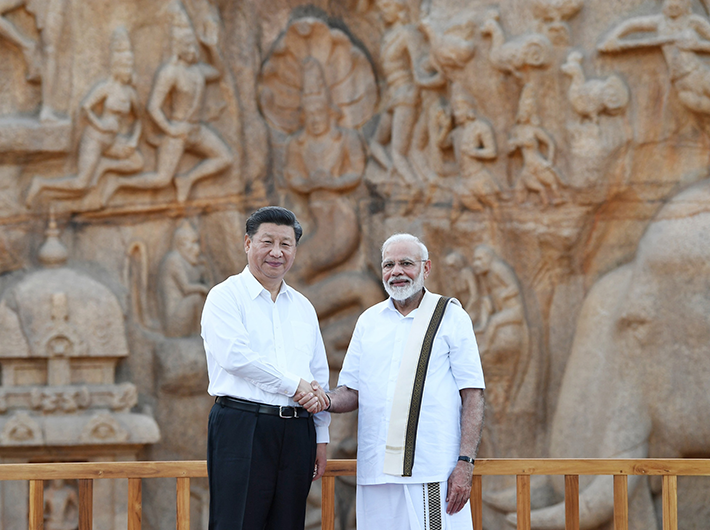At Mamallapuram, a fresh diplomatic effort was in full display despite persisting differences
Prime minister Narendra Modi has accepted president Xi Jinping’s invitation to visit China in 2020 for their third informal summit after Wuhan and Mamallapuram, indicating both sides’ realization of the importance of the mechanism which gives the two leaders of the Asian giants an opportunity to strengthen their bonding.
The bonding was clearly on display during October 11-12 at Mamallapuram in Tamil Nadu where Modi gave Xi a guided tour of the temple town, and the two spent six hours to discuss bilateral, regional and international issues one-to-one. “You and I had engaged in candid conversations like friends, heart-to-heart discussions on bilateral relations,” the Chinese president said, adding “We are really overwhelmed by your hospitality.”
This also speaks volumes about the chemistry between the two leaders. Former Indian high commissioner to Pakistan G Parthasarathy said: “Personal relationship matters in diplomacy.” His argument is that the 1962 war with China had taken place because “relations between then Indian prime minister Jawaharlal Nehru and then chairman of the People’s Republic of China and founder leader of China’s communist party Mao Zedong had deteriorated beyond repair.”
However, even as China opens itself to the language of chemistry, it remains firm in its traditional ways. Only 24 hours before his arrival in India, the Chinese president invited Pakistan prime minister Imran Khan for a meeting, while after concluding his two-day informal summit in Mamallapuram, he left for Nepal for a meeting with prime minister KP Oli, a communist leader who is known for his pro-China inclination.
Both developments indicate that China is not yet in position to invest trust or deepen mutual understanding with India. “After the Wuhan summit, China had agreed to reduce trade deficit with us and Chinese leaders had promised to open their market for India’s pharmaceutical and IT sectors and also for non-Basmati rice and some other agricultural products in which we have competitive advantage over others in terms of quality and pricing, yet Beijing didn’t fulfill those promises,” Ashok Sajjanhar, a retired diplomat said, reminding that it was president Xi who had, during his visit to India in September 2014, pledged to invest $20 billion in India in the next five years, but so far the country has received only $3-3.5 billion worth of Chinese investment.
This time around when the issue of India’s trade deficit with China, over $53 billion, was raised during bilateral talks, it agreed to discuss it in a concrete way. “There was a good conversation on trade as we know that this is an issue which has been a concern here back home and president Xi Jinping after hearing out our prime minister on this issue said that China is ready to take sincere action in this regard and to discuss in a very concrete way, how to reduce trade deficit,” foreign secretary Vijay Gokhale said while briefing media persons in Chennai.
Taking it forward, China agreed to set up a ministerial level mechanism to discuss trade, investment and services. Finance minister Nirmala Sitharaman and vice premier Ho-Chun Hua will discuss the way to address trade deficit issue.
The two sides will decide on when and how to activate this mechanism after a thorough discussion among their officials. China also welcomed investment from India, including in the information technology and the pharmaceutical sectors. On the face value, it appears to be a significant move by China to win over India which has persistently maintained skepticism over Chinese telecom major Huawei’s plans to enter the field of 5G applications in India.
Only a few days before president Xi’s visit, India gave approval to Huawei to take part in a demonstration of 5G applications during the three-day India Mobile Congress starting from October 14 in New Delhi. In fact, apart from negative reports about Huawei’s 5G applications from the US, Australia, Singapore, South Korea and Japan, there is a huge section within the country’s strategic and security community who feels that national security will be threatened if Huawei is allowed to roll out its 5G in India.
But as Modi termed Mamallapuram’s informal summit with Xi as a “new chapter” in India and China’s ties, both New Delhi and Beijing, displaying their maturity, also decided to “prudently manage” their differences and remain “sensitive to each-others concern”.
Amid this, during delegation level talks, president Xi mentioned about Imran Khan’s visit to China, yet there was no mention of Kashmir in his speech, clearly showing Beijing’s deliberate attempt to avoid any further mudslinging on the issue which involves India’s sensitivity. In that context, the Chinese president’s call for enhanced military-to-military engagement between the two countries, and invitation to defence minister Rajnath Singh to visit China have indicated Beijing’s intention to broad-base its relationship with India which is yet to sort out its differences on issues related to border.
Overall, a fresh diplomatic construct was in full display in Mamallapuram, and for this prime minister Modi’s dexterity and president Xi’s maturity must be acknowledged.

